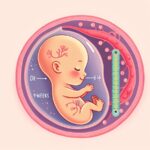Understanding the importance of DHA supplements for brain development in the fetus is crucial for expecting mothers aiming for a healthy pregnancy. Docosahexaenoic Acid (DHA) is a type of omega-3 fatty acid that plays a significant role in the growth and functional development of the brain in infants. This article explores the benefits of DHA supplements, how they aid in fetal brain development, and the best ways to include them in your pregnancy diet.
What is DHA and Why is it Important?
DHA is a primary structural component of the human brain, cerebral cortex, skin, and retina, making it a critical nutrient for fetal development, especially in the third trimester when significant brain growth occurs. Adequate intake of DHA during pregnancy is associated with improved cognitive outcomes and visual acuity in infants. However, the body cannot produce DHA in sufficient amounts, which means it must be obtained through diet or supplements.
Research suggests that DHA supplementation during pregnancy can improve the length of gestation and may help reduce the risk of preterm birth. This is crucial for fetal development as it allows more time for the brain to mature in the womb.
DHA Supplements for Brain Development in Fetus?
The recommendation for DHA intake during pregnancy varies, with many health organizations suggesting at least 200 mg of DHA per day. DHA supplements offer a convenient and effective way to ensure that expecting mothers meet their daily DHA needs. They are especially beneficial for those who do not consume sufficient amounts of DHA-rich foods, such as fatty fish.
Studies show that DHA supplements can have a positive impact on the neurodevelopment of children, including better attention, improved problem-solving skills, and higher IQ scores in early childhood. This underscores the importance of DHA for early brain development and the potential long-term benefits of DHA supplementation during pregnancy.
How to Choose and Use DHA Supplements
When selecting a DHA supplement, look for products that are specifically designed for pregnancy and are third-party tested for purity and potency. It’s also important to choose supplements derived from high-quality sources, such as fish oil or algae, to minimize exposure to toxins like mercury.
Consult with your healthcare provider before starting any supplement, including DHA, to discuss the appropriate dosage based on your dietary intake and nutritional needs. Incorporating DHA supplements into your daily routine can be as simple as taking a capsule with a meal to ensure optimal absorption.
Natural Sources of DHA
Besides supplements, DHA can also be found in natural food sources. Fatty fish, such as salmon, mackerel, and sardines, are among the richest sources of DHA. For vegetarians or those who prefer not to eat fish, algae-based DHA supplements and DHA-fortified foods provide viable alternatives.
Incorporating DHA-rich foods into your diet not only supports fetal brain development but also contributes to your overall health during pregnancy. Eating two servings of low-mercury, fatty fish per week is a practical guideline for expecting mothers to follow.
Conclusion
DHA supplements for brain development in the fetus play a pivotal role in ensuring the healthy growth of the infant’s brain and visual systems. By understanding the importance of DHA and incorporating it into the pregnancy diet through supplements or natural sources, expecting mothers can support their baby’s cognitive development and overall health. Always remember to consult with your healthcare provider to tailor your DHA intake according to your specific needs.
For more information on pregnancy and fetal development, consider exploring our resources on the importance of folic acid in early pregnancy, how to cope with morning sickness at 8 weeks, and the importance of the third trimester growth scan.













